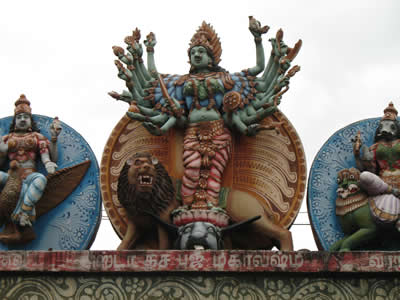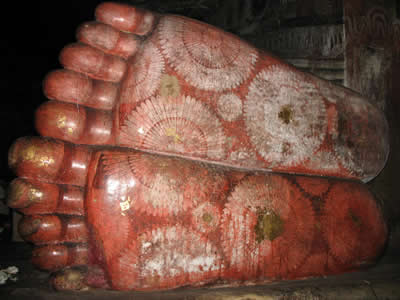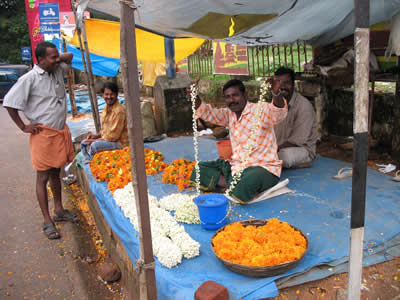Fulbright Phooey! Part 2
|
Michael Rose [January 2007.] Welcome to the second installment of “Lost in India.” I waited some time before writing in hope of having more good news, but still no Fulbright, still no keyboard. Three months and counting. There’s something of a scandal in the works. Last year’s applicants waited as long as 11 months for research clearance — one person 16 months and counting! — yet we were never told to prepare for delays. This amounts, methinks, to a lie of omission, especially since I’ve asked repeatedly for information about last year’s grant dates. My questions were ignored. If only they’d been straight with us, so many of the problems of the last few months could have been avoided. The keyboard thing has been beyond absurd. It now looks as though it’ll be coming this weekend (though I’ve thought that many times before). Miriam compares our situation to being out of work. The job may come any day, it’s hard to plan ahead, and stress doesn’t help. At least I’ve been able to catch up on some reading.
We’ve done more traveling, most rewardingly to Kerala’s state capital for a few days of culture and beach. We’re now at an arts festival with two other Americans also awaiting Fulbrights. Thanksgiving dinner looks to be far removed from turkey and stuffing — more like squid masala. With the temperature around 85 degrees, it doesn’t feel remotely like Thanksgiving. I actually like winter but can definitely live for a year of perpetual July. While I’ve never been much of a bird watcher, looking out our windows and seeing an escaped pet shop frolicking about the banana trees has been a treat. We’ve been taking Malayalam lessons from someone who runs an English institute here. He won’t take money, so in exchange we help him and his students with their English. He’s into saying things like “devil’s advocate,” “putting your foot in your mouth” or his favorite, “freaking out.” His students all long to work in a call center. (I’d like to get him to say things like “Yo, sup dawg,” so that the next time I call Citibank and get an operator in Bangalore we can go over my account in dated rap.) We’ve had some interesting conversations with the students about politics. Everyone hates Bush, Sonia Gandhi runs things, most prefer arranged marriages and so on, along with the usual questions. The Americans about whom people know at least something are Lincoln, MLK and JFK. There seems to be great pride in Kerala, with everyone asking what we think of “God’s own country” and what our favorite food is. I once made the mistake of saying sushi and was met with a plaintive “You don’t like Kerala food?” We’re asked what we think of the climate and so on, followed usually by being told that we’ll be happy here. Everyone likes playing tour guide. On my last bus ride my neighbor was eager to inform me about highlights such as the “important” convention center and “famous” railway station. It’s probably a stretch to link such talks with the Communist government or even a pervasive sense of community, but it’s interesting to contrast local attitudes with ideas of American individuality and diversity. There’s such uniformity of food, clothing, houses, even whole towns, along with ethnicity, there being so little immigration to Kerala. Every restaurant serves the same menu and every little hardware or grocery store stocks the same goods. Even the ads are interchangeable, an exception being Rambo Salon, where I had my first haircut. Inside, it’s like the others, but one look at that handpainted sign of Sly with giant gun and I knew this was the place for me. There not much here that’s American, and what there is seems random: professional wrestling, Tom and Jerry, Back Street Boys, news about Madonna’s adoption.… The uniformity of conversation is hard to deal with. From the guided tours to the perennial “Is wrestling real,” it sometimes feels as if we’re in a Groundhog Day remake, minus the enlightened ending.
We’ve heard that as more money comes to Kerala, mostly from jobs in the Gulf emirates, the culture changes: People want bigger houses, the women are kept more hidden, and there’s that call-center dream. However short-sighted, it’s all about salary, e.g., the wife good money can command. Very few of the students we’ve talked to seem to have a plan beyond that thought. Back in the States, a few people predicted we’d return slower-paced and relaxed. So far this is not the case, our stress owing largely to grant and piano snafus. And the towns are anything but calm, certainly not the image of ayurvedic spas, yoga, and meditation that the Times travel section dwells on. My cousin described her visit to India as having put all her senses on overload, probably the most accurate summation I’ve yet heard. I’m curious about the stress I encounter. Is it the money? Are people happier now? This ties in to the globalization issue, I suppose. Poor countries shouldn’t be denied opportunities, but at what cost to tradition, culture and the individual? On the other hand, it’s hard to imagine that Mumbai was ever calm. Who knows, maybe I’ll reach a point where it just stops mattering. I do sometimes find myself falling back on my New York attitudes, wanting to be self-reliant, wanting to go back to Western food and music, wanting to cuss at will…. While I may yet look back on this trip fondly, I’ll be happy to be home. The appeal of the new and exotic has lost its edge. People are still people and the plusses come with limitations. It’s not as if there’s a Taj Mahal around every corner. While happiness comes from within, who’d have guessed that this trip would make me less eager to travel? I’m realizing that what I really value are work and friends. Language and conversation are important even for someone who prefers holing up with a piano. Having things actually work as they’re supposed to is nice, too, not to neglect hot water and being able to buy Ben and Jerry’s at two in the morning. None of this really amounts to a revelation — more like reminding me of things it’s easy to take for granted. On music: It looks as though I’ll be going to Serbia next summer with the South Oxford Six, a composers group I’m part of. We’ll be there a week leading workshops and concerts for composition students. On the bad side, my mridangam lessons, which had been going well despite what I was told were the “normal” bruises, aches and swellings of a beginner, are on hold. As best I can tell through self-diagnosis, I’ve got a stress fracture. (Stress again!) I saw a doctor a few days ago. In the course of a 90-second exam, he poked my hand and asked if there was any foreign object in it. On being told no, he gave me antibiotics to combat foreign-object-infections and promptly exited. I can move my hand pretty well. It’s just this one spot I can’t touch without yelping, so the problem shouldn’t limit other activities too much. Back to good: I’ve been learning a lot about Indian music and early Western music, reading about Greek music and chant, listening to early Renaissance stuff, singing through lots of pieces, and I’m seeing parallels. Indian Kathakali and Greek theory and some Hebrew melodies involve similar constructions. I don’t want to go on about this here, but if anybody’s interested in talking about it or knows of books, etc., I’d be interested in hearing from you.
On to other things: An article in The Hindu tells us that the state of Meghalaya is offering incentives to encourage childbirth. Not all that strange perhaps to have government help for, say, a third kid in a region with a declining population. But these incentives don’t kick in until the 15th child! And people are collecting! One thing that’s striking on arrival is the attitude of males towards each other. Men and women are largely separate, and boys especially have their hands all over each other. It’s common to see pairs holding hands, groups with their arms around each other — an obvious cultural difference we don’t hear about in America. It wasn’t altogether surprising to read in an India Today survey that 37% of single men say they’ve had some homosexual experience. At first glance, the number seemed to me rather high. While homosexuality is considered taboo, there’s also the taboo on premarital hetero sex, with marriages happening around age 25 for men, when they’ve finished school and have jobs. For women it’s younger, 20, sometimes less, and in some rural areas, we’re told, sometimes much less. For a college-age guy who can’t find a woman willing to ruin herself before marriage, the culture of male physical companionship gives 37% the ring of truth. Lastly: Many of the Indian musicians I’ve met would be happy to come to the US for performances, workshops or teaching. It may be a long shot, but if anyone is interested in bringing dancers, drummers, a whole kathakali troupe, whatever, to your university or performance space, email the editor and I’ll put you in touch. I’ll mention one person in particular, since he’s planning a lecture tour of the US this spring, an administrator at the school I’m attending. He’ll be talking about South Indian traditions, especially those unique to Kerala. OK, that’s plenty for now.
[Return to Part 1 or continue to Part 3.]
[More Michael Rose, Photo Essay]
[Previous Article:
Fulbright Phooey! Part 1]
[Next Article:
Mostly Symphonies 4.]
|


